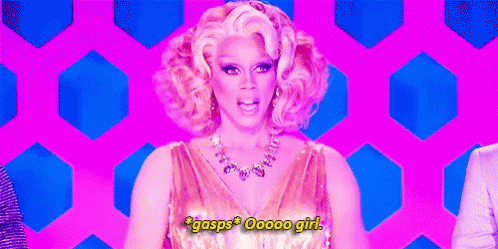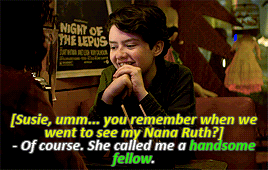Our society is littered with too many unnecessary contemporary issues that are just begging to be fixed: gun violence; terrorism; global warming and climate change; Donald Trump. So, ask yourselves, why do we need to add something else to this list of things that are already making this century problematic enough?
It is because people are blind to – and refuse to believe – the fact that language is sexist.
Facts are facts, yet too many of us abstain ourselves from acknowledging that language is different to what it is was eighty years ago. However, despite this, then and now, language continues to be sexist. Language was sexist then and it is sexist now (although, considerably less than what it was).
If you do not believe me, that’s fine! But you are wrong. It is written within our history.
Or should I say HERstory?
Popularised by RuPaul, the drag queen who presents the hit reality television show ‘RuPaul’s Drag Race’, the term is used to refer to all of the queens that have appeared on the show. A feminist lens is used by RuPaul in order to obtain a female reclamation of the word, as well, resulting in the term having dual denotations.
Even the general term of the past events of one’s country appears to be sexist. Perhaps we need a new, more updated and more socially relevant term? Or do the ideologies of people within society need to be rebooted and updated to the ‘social norms’ package?
Without looking into etymology, ‘history’ – as one can clearly see – is constructed of two words: “his” and “story”. Their combined semantics create the impression that the tales of people, who are currently living and those who were alive well before us, where merely about men.
The word’s origin even supports this. ‘History’ is derived from the Greek word ‘Historia’ – this has denotations of finding something out (especially one’s narrative). Yes, I know, there is no visible sexism here.
But there is in ‘Histōr’, which is the Greek word of which ‘Historia’ originated from, which can be defined as a wise, knowledgeable man.
Again, the never-ending argument of ‘does ‘man’ refer to the male gender or to a general person?’ returns to haunt us. I’ll let you make up your own mind about that.
Yet despite this, our modern term ‘history’, which came around in Late Middle English, still implies that they are his stories, and are his only.
But they are not.
They are our stories: the stories of our ancestors, our monarchies, of our past societies, of us. Our past may be saturated by masculinity but it has not stopped the necessity for women. Queen Victoria’s reign was one of the longest and one of the greatest. But she did not have a kingdom – no, she had a queendom. Kingdom and queendom are other examples of redundant, sexist lexis within the English language. Why do we feel the need to specify gender when talking about particular things? Specification gives the impression that there is negativity surrounding the opposing term: a “kingdom” is viewed along with power yet “queendom” does not quite have the same connotations due to the mere fact that it is less widely used and therefore not as recognised.
While “herstory” has the same implications of “history” but in relation to the female gender, it is used to rebel from the domination of forced masculinity within linguistics; it is used to conquer what women could not before. Swapping the inclusion of the male pronoun to the female pronoun has blessed our wishes of having a more accepting, society that strives to stop sexism within linguistics.
Media’s views have also been shifting. In an episode of ‘Chilling Adventures of Sabrina’ (the remake of ‘Sabrina the Teenage Witch’), one of the characters has come out as transgender. The female character of Susie Putnam now wants to be referred to as Theo Putnam.
During this episode, we see Harvey and Roz accept Theo straight away and congratulate him where Theo’s father is not. He even continues to refer to Theo with female pronouns during his explanation.
Now, my question for you is:
Why do the preferred pronouns of transgender people disturb us so much?
We refer to women as she, and we refer to men as him. So, when a woman believes she should be a man or when a man believes he should be a woman, why does their wish of being referred to by their preferred pronouns disturb people? These disturbed people were using gendered pronouns to refer to them prior to that person’s transgender discovery.
So, please, enlighten me: what is the problem?
Answer: there shouldn’t be one.
Singer Sam Smith knows he isn’t the only one when it comes to struggles with gender pronouns. He has been criticised for not using gender pronouns within his songs, despite wanting his “music to be sung by absolutely everyone”.
The singer who came out as gay in May 2014, has certainly accomplished that. The lack of gender pronouns in his music has prevented it from appealing to social groups of particular sexualities. The music he produces is inclusive of everyone, so I fail to see why he is receiving criticism.
In an article responding to the sexist row that a publisher of the Oxford Dictionary faced for having a sexist bias of how certain words are used, David Shariatmadari states that “Sexist assumptions find their way into speech and writing for the simple reason that society is still sexist.”
It is not a lie that the language used within a society reflects society itself – at least to any decent linguist.
So perhaps there is a slight possibility that language is not actually sexist. This miniscule glimmer of chance is derived from language uses. They are sexist, and because of that, so is their language.
To stop the sexism of language from governing our conversations, we need to find an equilibrium. Society will not just hand it to us – that’s too easy, too simple. Once we have found a suitable balance, men and women will have the same linguistic opportunities in conversations. When, and only when, we have accomplished all of this, will it go down as one of the greatest linguistic gender wars in herstory.








lol yes donald t is very much an issue
ReplyDeleteI agree; but you have to admit that ever since he's been the President the American economy has been boosted massively.
DeleteHmm times have definitely changed. I think it is very clear that as society changes, so does the language that's used within it. For example, Polari was used when being gay was a taboo subject (it still is in some countries, but I'm talking specifically about 16th or century English [I think it's around about then, maybe 19th century too]) so that lgbt people could figure out if that cute guy sitting next to them on the bench was also gay. Polari obviously isn't used anymore, but that's because there isn't a need TO use it, so it died out. Do you think that a dialect similar to Polari will come around if people need to talk about a taboo subject? Or do you think that because our modern society is more socially aware & educated, people would just talk about it normally?
ReplyDeleteIf there was a need for a dialect like Polari, I think that it will come around.
DeleteLesley Milroy (1980) did a study on social networks (which is a group of people that interact regularly). She says that an individual can belong to many social groups, and this therefore proves that people from different backgrounds do interact & mix together. Because of this, there was an important influence on their language.
So let's take Milroy's social networks: if they were banned from talking about a particular topic, but still needed to converse about it, then yes, I do think a new dialect will be created. Because if you're not inside the social network, then you won't understand the dialect. Then there's always the addition of convergence, divergence and prestige (but that's a matter for another time).